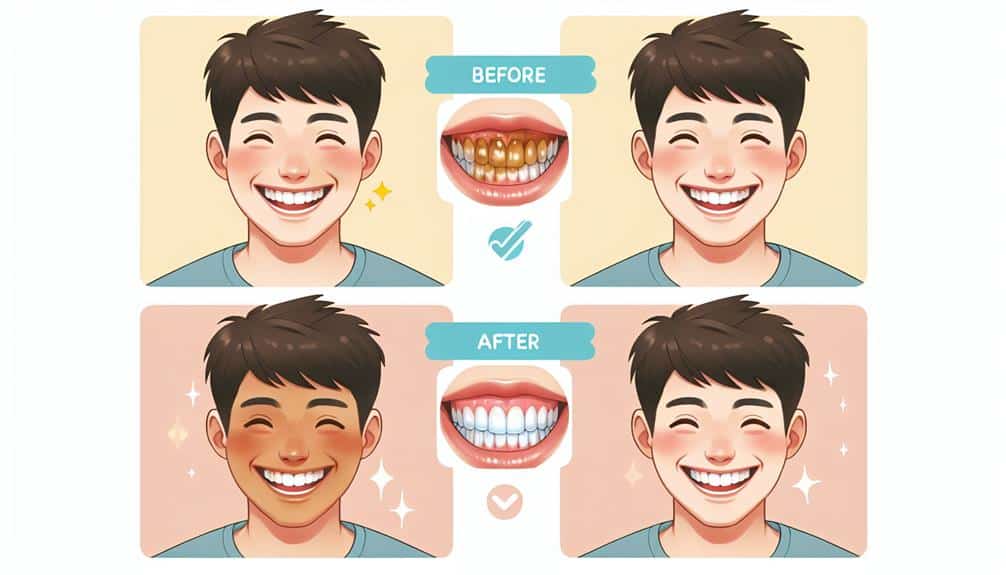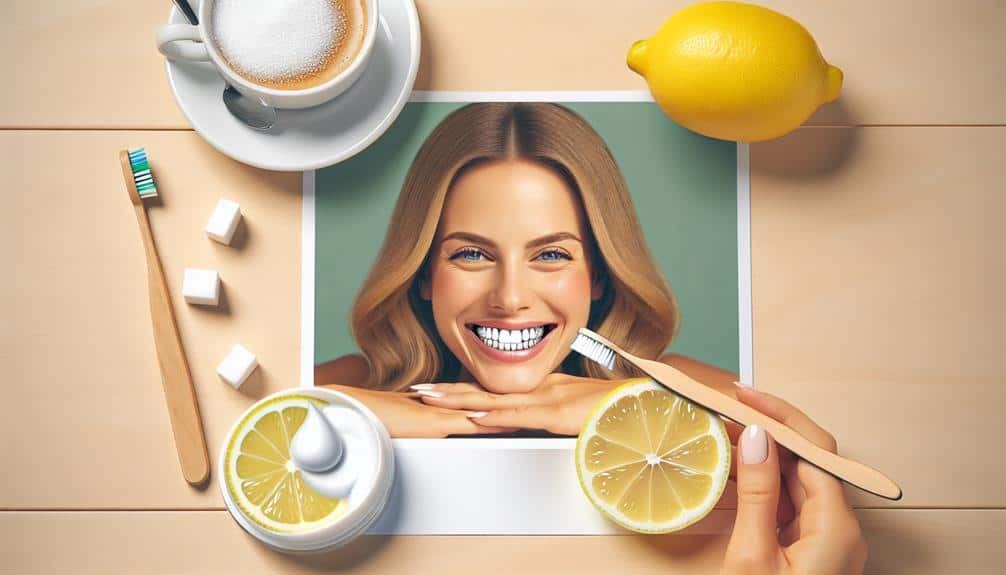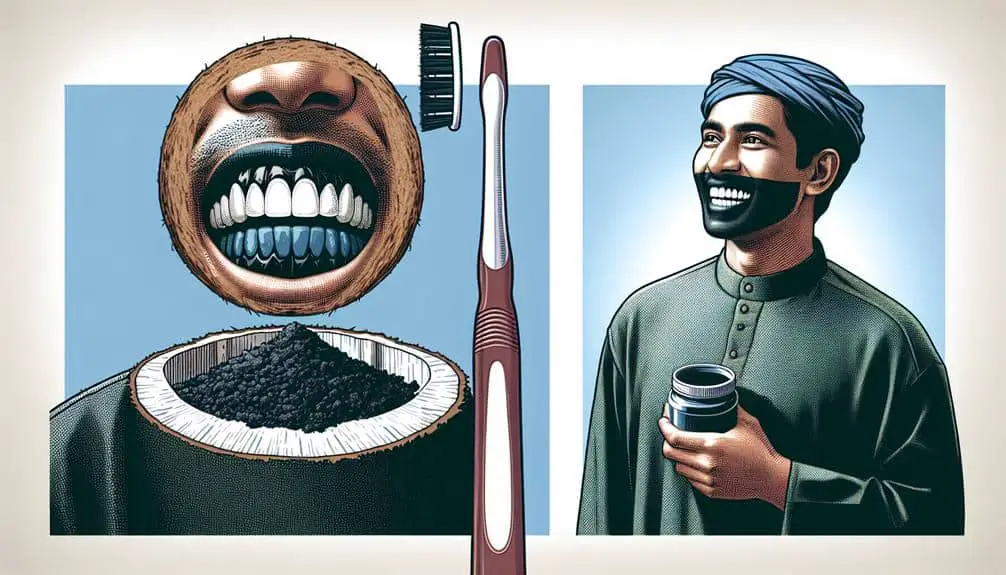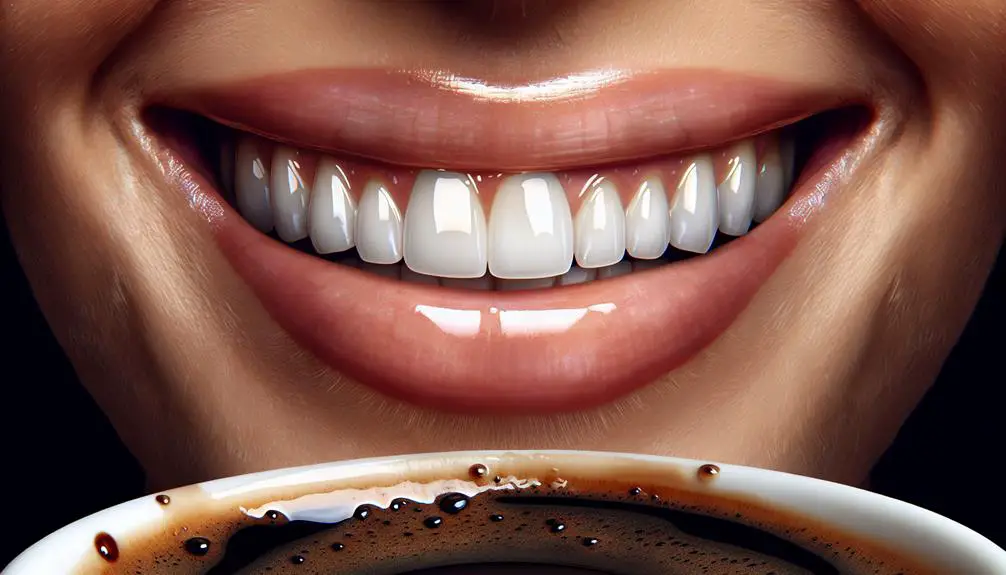Remove coffee stains effectively from your teeth by trying natural remedies like baking soda and hydrogen peroxide. Professional whitening treatments with carbamide peroxide are potent options. Prevent future stains by maintaining good oral hygiene and rinsing your mouth after consuming coffee. Lifestyle changes such as opting for crunchy fruits can help. These tips can restore your bright smile.
Key Points
- Regular dental cleanings prevent and reduce coffee stains on teeth.
- Use natural remedies like baking soda and hydrogen peroxide for surface stain removal.
- Professional whitening treatments effectively eliminate stubborn coffee stains.
- Maintain good oral hygiene, limit coffee intake, and rinse with water after consumption.
- Lifestyle changes such as dietary adjustments and regular dental check-ups maintain brighter teeth.
Understanding Coffee Stains on Teeth
Understanding how coffee stains teeth requires recognizing the impact of pigmented compounds from coffee on tooth enamel. Coffee contains chromogens, which are deeply pigmented molecules that can adhere to the enamel of your teeth. These compounds, along with tannins, are notorious for causing discoloration. When you consume coffee regularly, these substances can gradually build up on your teeth, leading to noticeable stains over time.
Maintaining good dental hygiene is essential in preventing and reducing coffee stains on your teeth. Brushing your teeth after consuming coffee can help remove some of the pigmented compounds before they've a chance to adhere firmly to your enamel. Additionally, incorporating regular dental cleanings into your oral care routine can assist in keeping coffee stains at bay.
Your diet choices also play a significant role in the prevalence of coffee stains on your teeth. Consuming acidic foods and beverages alongside coffee can exacerbate enamel erosion, making it easier for pigmented compounds to penetrate the teeth. Opting for a balanced diet and minimizing acidic foods can help preserve your enamel and reduce the likelihood of coffee stains.
Natural Remedies for Coffee Stains
To combat coffee stains on your teeth, exploring natural remedies can offer effective solutions for maintaining a brighter smile. Herbal remedies such as using a mixture of baking soda and hydrogen peroxide can help remove surface stains caused by coffee consumption. Baking soda acts as a mild abrasive that gently scrubs away stains, while hydrogen peroxide has bleaching properties that can lighten discoloration. Creating a paste by combining these two ingredients and brushing your teeth with it a few times a week can gradually reduce coffee stains.
DIY solutions like oil pulling with coconut oil may also aid in removing coffee stains. Coconut oil has antimicrobial properties that can help in oral hygiene and potentially reduce staining. Swishing a tablespoon of coconut oil in your mouth for about 15-20 minutes each day may contribute to a brighter smile over time.
Incorporating these herbal remedies and DIY solutions into your oral care routine can complement regular brushing and flossing, assisting in the battle against coffee stains on your teeth.
Professional Whitening Treatments
Professional whitening treatments offered by dental professionals can effectively remove stubborn coffee stains from your teeth, providing a noticeably brighter smile. Cosmetic dentistry procedures such as dental bleaching are commonly used to whiten teeth and eliminate discoloration caused by coffee consumption.
During a professional whitening treatment, a protective barrier is placed over your gums to shield them from the whitening agent, which is then applied to your teeth. This agent breaks down the coffee stains, lifting them from the tooth enamel.
Dental bleaching, a key component of professional whitening treatments, involves the use of carbamide peroxide or hydrogen peroxide to penetrate the teeth and lighten them. These treatments are typically more potent than over-the-counter whitening products, resulting in quicker and more noticeable results.
Your dentist can customize the whitening process to suit your specific needs, ensuring a safe and effective treatment. For individuals seeking a rapid and long-lasting solution to coffee stains, professional whitening treatments in cosmetic dentistry offer a reliable option.
Preventing Coffee Stains in the Future
To prevent future coffee stains on your teeth, maintain good oral hygiene habits and limit your coffee consumption to reduce the risk of discoloration. Proper oral hygiene practices, such as brushing your teeth at least twice a day and flossing daily, can help remove surface stains before they become prominent. Consider using a whitening toothpaste that contains important or peroxides to prevent staining. Additionally, rinsing your mouth with water after consuming coffee can help wash away some of the staining compounds before they adhere to your teeth.
Furthermore, dietary habits play a vital role in preventing coffee stains. Avoid prolonged exposure to coffee by consuming it in one sitting instead of sipping it throughout the day. Using a straw to drink coffee can also minimize direct contact with your teeth, reducing the chances of staining. Alternating between coffee and water can help dilute the coffee's staining effects. By being mindful of your oral hygiene and dietary choices, you can proactively prevent coffee stains on your teeth.
Lifestyle Changes for Brighter Teeth
Consider incorporating lifestyle changes such as adjusting your diet and habits to achieve brighter teeth and maintain a healthier smile. Diet changes play a significant role in the color and health of your teeth. Limiting the intake of foods and beverages that stain teeth, such as coffee, tea, red wine, and dark berries, can prevent discoloration. Opt for teeth-friendly options like crunchy fruits and vegetables that can naturally scrub your teeth while you chew. Additionally, incorporate calcium-rich foods like dairy products for stronger enamel and overall dental health.
In addition to diet changes, improving your oral hygiene habits is important for brighter teeth. Brush your teeth at least twice a day with fluoride toothpaste and floss daily to remove plaque and prevent staining between teeth. Consider using a whitening toothpaste or mouthwash to help maintain a brighter smile. Regular dental check-ups and professional cleanings can also aid in keeping your teeth bright and healthy. By making these lifestyle adjustments, you can enhance the appearance of your teeth and promote ideal oral health.
Frequently Asked Questions
Can Coffee Stains on Teeth Lead to More Serious Dental Issues Over Time?
Coffee stains on teeth can lead to more serious dental issues over time. To prevent long term consequences and health risks, prioritize oral hygiene. Regular brushing, flossing, and dental cleanings can help maintain a healthy smile.
Are There Any Specific Types of Toothpaste or Mouthwash That Are More Effective at Removing Coffee Stains?
For the best toothpaste options, look for those with whitening agents like hydrogen peroxide. Consider top mouthwash recommendations containing fluoride to help fight coffee stains. Regular use of these products can help maintain a brighter smile.
How Long Does It Typically Take to See Noticeable Results When Using Natural Remedies for Coffee Stains?
For quick results with natural remedies, you may notice changes in a few weeks. However, consistency is key for long-term coffee stain prevention. Stay dedicated to your routine to see lasting effects on your teeth.
Are Professional Whitening Treatments Safe for Individuals With Sensitive Teeth?
Seeking sensitivity solutions before scheduling professional whitening treatments is wise. Alternatives like gentle whitening toothpaste or consulting a dentist for specialized options can alleviate concerns. Prioritize your comfort and oral health in your decisions.
Are There Any Specific Foods or Drinks to Avoid in Order to Prevent Coffee Stains From Reoccurring in the Future?
To prevent coffee stains from reoccurring, consider dietary changes and lifestyle adjustments. Avoiding dark beverages like coffee, tea, and red wine can help. Brushing after consuming staining foods and drinks, along with routine dental cleanings, are key preventive measures.



